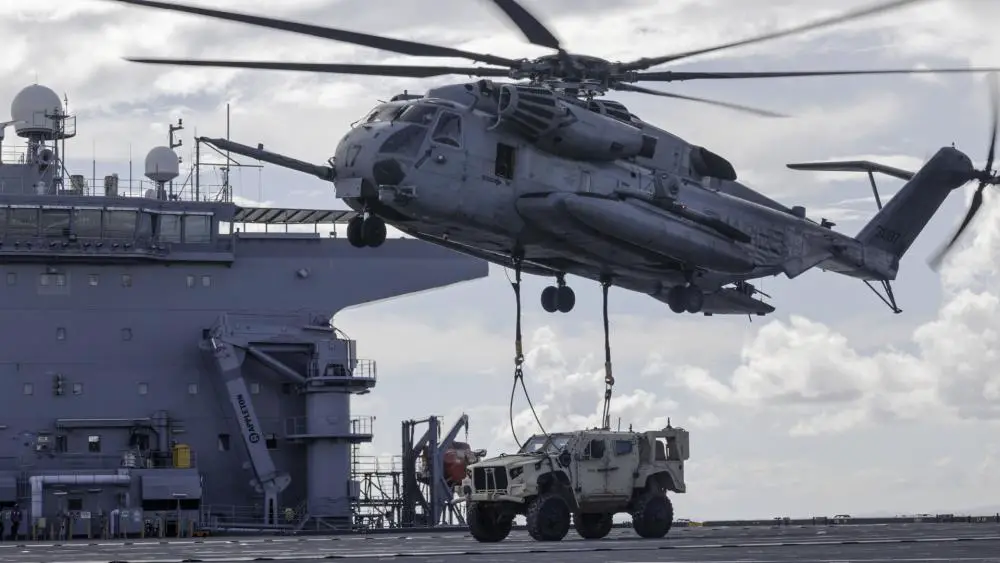Marines from 31st Marine Expeditionary Unit logistics combat element, Combat Logistics Battalion (CLB) 31, worked alongside the aviation combat element, Marine Medium Tiltrotor Squdron-262 (Reinforced), to successfully execute a shore-to-ship and back to shore transport of a Joint Light Tactical Vehicle (JLTV) with a CH-53E Super Stallion. The planning and execution of this JLTV helicopter external lift operation integrated every part of the 31st MEU Marine Air Ground Task Force alongside U.S. Navy Amphibious Squadron 11 and the USS Miguel Keith (ESB-5). This was the first time a Marine Corps JLTV was moved from shore to ship by air, highlighting the capabilities of both platforms and allowing the 31st MEU a new opportunity to implement Expeditionary Advanced Base Operation (EABO) concepts.

“This was primarily an opportunity to build our MEU team’s ability to move combat vehicles and weapon systems to, from, and between expeditionary advance bases from ARG shipping. The CH-53 and Helicopter Support Team provide a pretty unique capability to get those systems to otherwise inaccessible locations,” said Capt. Tyler J. Hopping, CH-53E pilot with VMM-262 (rein).
“CLB-31 is focused on challenging and realistic training that employs expeditionary advanced base logistical resupply and prepositioning of critical equipment in support of the Naval Expeditionary Force,” said Lt. Col. Matthew Verdin, commanding officer of CLB-31.

The Sikorsky CH-53E Super Stallion is a heavy-lift helicopter operated by the United States military. As the Sikorsky S-80, it was developed from the CH-53 Sea Stallion, mainly by adding a third engine, adding a seventh blade to the main rotor, and canting the tail rotor 20°. It was built by Sikorsky Aircraft for the United States Marine Corps. The less common MH-53E Sea Dragon fills the United States Navy’s need for long-range minesweeping or airborne mine countermeasures missions, and perform heavy-lift duties for the Navy. The CH-53E was designed for transporting up to 55 troops with the installation of seats along the cabin center line or 30,000 lb (13,610 kg) of cargo, and can carry externally slung loads up to 36,000 lb (16,330 kg). The Sikorsky CH-53K King Stallion, which has new engines, new composite rotor blades, and a wider aircraft cabin, is set to replace the CH-53E.

This helicopter external lift operation was initiated with the CH-53E lifting the JLTV from a beach within a secured military training area in Okinawa, Japan and proceeded entirely over water to the USS Miguel Keith. The CH-53E proceeded back to the pick-up location, with the load, after conducting multiple lifts aboard the USS Miguel Keith; simulating the establishment of an expeditionary advanced base from naval amphibious shipping. This training evolution was a crucial step in further integrating subordinate elements of the 31st MEU and providing a path for developing future EABO capabilities with similar platforms. The crew that executed this event previously conducted several prior JLTV lifts to maximize their readiness, proficiency and safety. The 31st MEU is operating aboard the ships of the Tripoli Amphibious Ready Group in the 7th Fleet area of operations to enhance interoperability with allies and partners and serve as a ready response force to defend peace and stability in the Indo-Pacific Region.
















